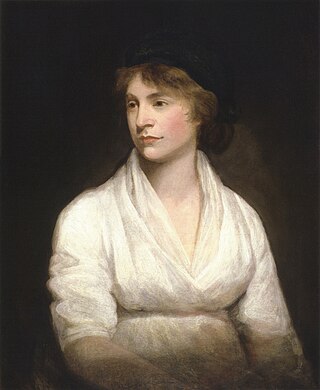
Mary Wollstonecraft was a British writer, philosopher, and advocate of women's rights. Until the late 20th century, Wollstonecraft's life, which encompassed several unconventional personal relationships at the time, received more attention than her writing. Wollstonecraft is regarded as one of the founding feminist philosophers, and feminists often cite both her life and her works as important influences.

William Godwin was an English journalist, political philosopher and novelist. He is considered one of the first exponents of utilitarianism and the first modern proponent of anarchism. Godwin is most famous for two books that he published within the space of a year: An Enquiry Concerning Political Justice, an attack on political institutions, and Things as They Are; or, The Adventures of Caleb Williams, an early mystery novel which attacks aristocratic privilege. Based on the success of both, Godwin featured prominently in the radical circles of London in the 1790s. He wrote prolifically in the genres of novels, history and demography throughout his life.

Charlotte Smith was an English novelist and poet of the School of Sensibility whose Elegiac Sonnets (1784) contributed to the revival of the form in England. She also helped to set conventions for Gothic fiction and wrote political novels of sensibility. Despite ten novels, four children's books and other works, she saw herself mainly as a poet and expected to be remembered for that.

Charles Brockden Brown was an American novelist, historian, and editor of the Early National period.

Elizabeth Hamilton was a Scottish essayist, poet, satirist and novelist, who in both her prose and fiction entered into the French-revolutionary era controversy in Britain over the education and rights of women.

Elizabeth Inchbald was an English novelist, actress, dramatist, and translator. Her two novels, A Simple Story and Nature and Art, have received particular critical attention.

Sensibility refers to an acute perception of or responsiveness toward something, such as the emotions of another. This concept emerged in eighteenth-century Britain, and was closely associated with studies of sense perception as the means through which knowledge is gathered. It also became associated with sentimental moral philosophy.
Mary Hays (1759–1843) was an autodidact intellectual who published essays, poetry, novels and several works on famous women. She is remembered for her early feminism, and her close relations to dissenting and radical thinkers of her time including Robert Robinson, Mary Wollstonecraft, William Godwin and William Frend. She was born in 1759, into a family of Protestant dissenters who rejected the practices of the Church of England. Hays was described by those who disliked her as 'the baldest disciple of [Mary] Wollstonecraft' by The Anti Jacobin Magazine, attacked as an 'unsex'd female' by clergyman Robert Polwhele, and provoked controversy through her long life with her rebellious writings. When Hays's fiancé John Eccles died on the eve of their marriage, Hays expected to die of grief herself. But this apparent tragedy meant that she escaped an ordinary future as wife and mother, remaining unmarried. She seized the chance to make a career for herself in the larger world as a writer.
The social novel, also known as the social problemnovel, is a "work of fiction in which a prevailing social problem, such as gender, race, or class prejudice, is dramatized through its effect on the characters of a novel". More specific examples of social problems that are addressed in such works include poverty, conditions in factories and mines, the plight of child labor, violence against women, rising criminality, and epidemics because of over-crowding and poor sanitation in cities.
George Walker was an English gothic novelist and publisher.
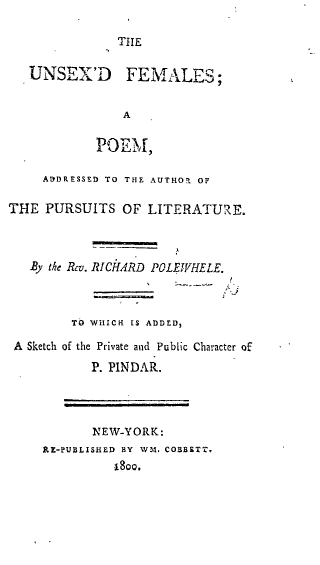
The Unsex'd Females, a Poem (1798), by Richard Polwhele, is a polemical intervention into the public debates over the role of women at the end of the 18th century. The poem is primarily concerned with what Polwhele characterizes as the encroachment of radical French political and philosophical ideas into British society, particularly those associated with the Enlightenment. These subjects come together, for Polwhele, in the revolutionary figure of Mary Wollstonecraft.

Maria: or, The Wrongs of Woman is Mary Wollstonecraft's unfinished novelistic sequel to her revolutionary political treatise A Vindication of the Rights of Woman (1792). The Wrongs of Woman was published posthumously in 1798 by her husband, William Godwin, and is often considered her most radical feminist work.
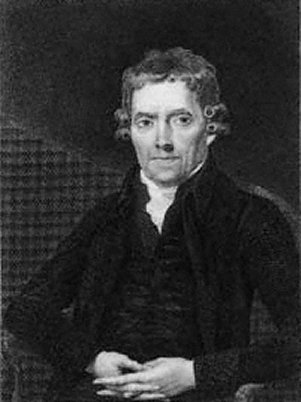
The Analytical Review was an English periodical that was published from 1788 to 1798, having been established in London by the publisher Joseph Johnson and the writer Thomas Christie. Part of the Republic of Letters, it was a gadfly publication, which offered readers summaries and analyses of the many new publications issued at the end of the eighteenth century.
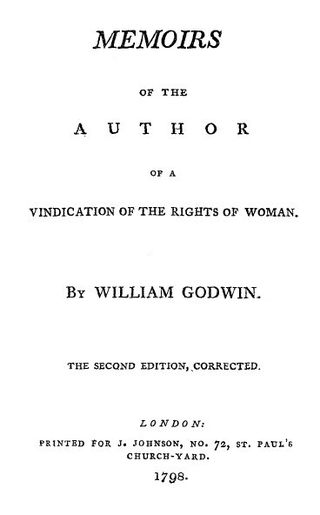
Memoirs of the Author of A Vindication of the Rights of Woman (1798) is William Godwin's biography of his late wife Mary Wollstonecraft. Rarely published in the nineteenth century and sparingly even today, Memoirs is most often viewed as a source for information on Wollstonecraft. However, with the rise of interest in biography and autobiography as important genres in and of themselves, scholars are increasingly studying it for its own sake.
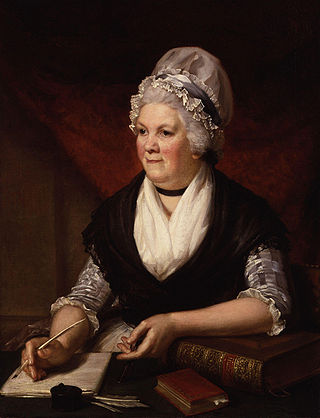
The Guardian of Education was the first successful periodical dedicated to reviewing children's literature in Britain. It was edited by 18th-century educationalist, children's author, and Sunday school advocate Sarah Trimmer and was published from June 1802 until September 1806 by J. Hatchard and F. C. and J. Rivington. The journal offered child-rearing advice and assessments of contemporary educational theories, and Trimmer even proffered her own educational theory after evaluating the major works of the day.

The Anti-Jacobin, or, Weekly Examiner was an English newspaper founded by George Canning in 1797 and devoted to opposing the radicalism of the French Revolution. It lasted only a year, but was considered highly influential, and is not to be confused with the Anti-Jacobin Review, a publication which sprang up on its demise. The Revolution polarized British political opinion in the 1790s, with conservatives outraged at the killing of the king Louis XVI of France, the expulsion of the nobles, and the Reign of Terror. Great Britain went to war against Revolutionary France. Conservatives castigated every radical opinion in Great Britain as "Jacobin", warning that radicalism threatened an upheaval of British society. The Anti-Jacobin sentiment was expressed in print. William Gifford was its editor. Its first issue was published on 20 November 1797 and during the parliamentary session of 1797–98 it was issued every Monday.
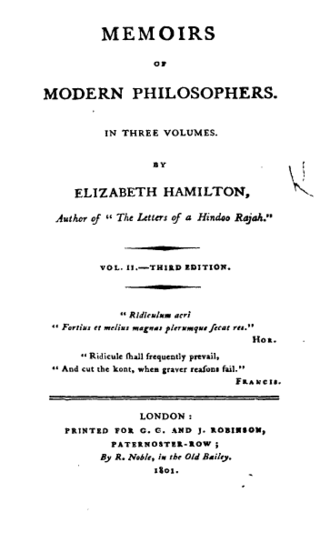
Memoirs of Modern Philosophers is a novel by British author Elizabeth Hamilton published in 1800. Responding to the Revolution Controversy of the 1790s and the debates about what roles women should occupy in English society, the novel contends that a poor education limits women's opportunities while at the same time arguing they should limit their activities to the domestic sphere. It occupies a middle ground between the liberal arguments of novelists such as Mary Hays and the conservative arguments by writers such as Hannah More.
The French Revolution greatly influenced the development of the English gothic novel.

Pamela Clemit, FRHistS is a British scholar, critic, and writer. She specializes in the eighteenth and nineteenth centuries, and works across the disciplines of literature, history, philosophy, and politics. She has particular expertise in the Godwin-Shelley family of writers.
Thomas Skinner Surr (1770–1847) was an English novelist whose most famous work was A Winter in London (1806). This popular tale of fashionable London life initiated a small genre of "season novels" and influenced silver fork novels in the 1820s and 1830s.















